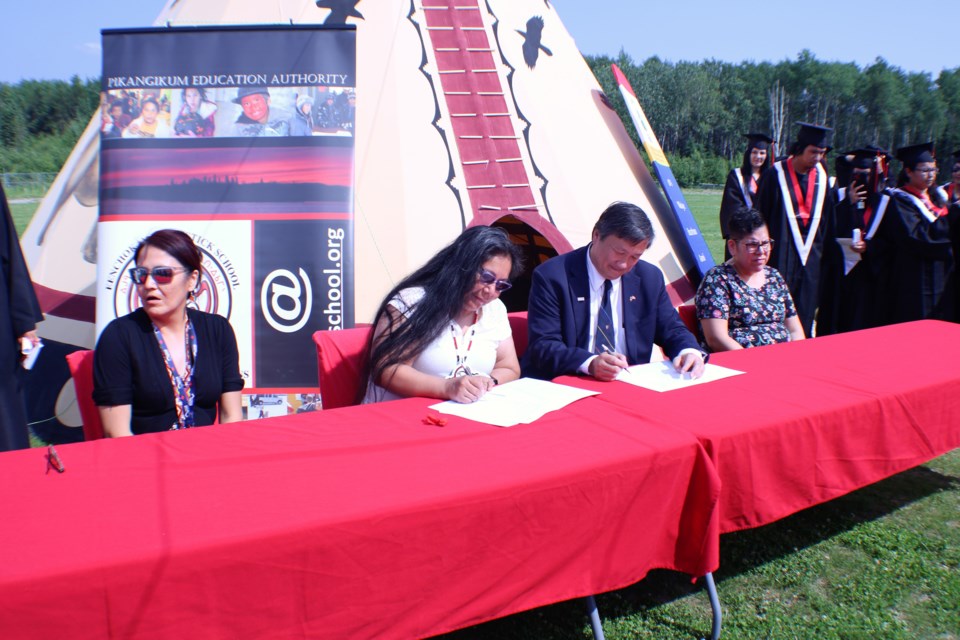PIKANGIKUM FIRST NATION — A new partnership will create new opportunities for people to get an education degree, and become teachers, without leaving their community.
After Eenchokay Birchstick School’s historic 2023 graduation ceremony on Wednesday, community members witnessed a special event as Pikangikum Chief Shirley Keeper and Queen's University associate dean of teacher education Dr. Peter Chin signed an agreement which will allow students to obtain a bachelor of education degree while studying in the community.
Chief Keepers, along with the Pikangikum education authority, advocated for Queen’s University's Indigenous Teacher Education Program.
“I'm so really excited. I can't imagine how many of our students will be enrolled in that program and have First Nations finish their teaching and be certified. We can have our children listen to their teacher in both languages and they can have a better understanding of concepts,” said Keeper.
There are several advantages this program offers to community members interested in teaching. It allows teachers to work and stay within their community but also allows the student to be taught in their language — Anishinaabemowin.
"The school, the Pikangikum education authority, and Chief and Council have made a concerned effort to make sure that the language continues by placing language-speaking community members into each classroom to help the teachers with translation and also teach the language for a certain block each day,” principal Cindy Spence said.
Although these community members do not have an Ontario teaching certificate, they step into each classroom to ensure Anishinaabemowin is preserved.
With the signing of the agreement with Queen’s University, those community members can obtain their teaching certificates and have access to a viable income.
“The program is the [Indigenous Teacher Education Program] and it's community-based, and what we do is we help to create elementary teachers through a very novel program called the multi-session program,” said Chin.
Chin said the program follows the rules set by the Ontario College of Teachers, but Indigenous participants only need a high school diploma to qualify for the bachelor of education program.
"We designed it in such a way that once they've completed the first term out of six, they're actually qualified for what's known as a transitional certificate of qualification and registration," Chin said. "They can be teaching in a school in September.”
The program is expected to begin in May 2024, in which the students will have a three-day orientation and then they’ll be sent off on a 15-day practicum to observe and assist in different schools.
Regular coursework would be done remotely through the month of June. In July, students will have three and a half weeks of in-class sessions at Queen’s University.
“The reason we do that, even though it's a far distance, our focus groups over the years that I've had running programs like this, noted students saying [they] didn't feel like a Queen’s student until I came to Queens,” said Chin.
From there, the students will qualify for a transitional certificate of qualification, which means by September they will be working in a paid teaching position at Eenchokay Birchstick School, which counts toward their student hours.
“This whole program is a gamechanger,” Chin said.
Although the students will be gaining work experience right away, they will be doing their coursework on weekends throughout the year until they finish the program.
Chin said the program aims to have 15 to 20 students starting next May, which makes the program viable.
“Therefore, for the second year, I have a class of 35 to 40, which is what helps make it viable for me. So, they just rotate through depending on their starting point. On average, we graduate 20 a year. That's what's happening in the other four sites. Right now, I'm graduating about 85 First Nations teachers every year to teach in first nations communities across this province,” Chin said.
The program also runs in Kenjgewin Teg (Manitoulin-North Shore), Lambton-Kent, Mushkegowuk Territory and Tyendinaga. Pikangikum is the fifth site to offer the program.
Chin is hoping to have more First Nation communities adopt the program in the near future.
However, the chief hopes the education program is only the beginning in Pikangikum. Keeper would like to see more programs that will allow students access to skilled trades.
“It would be a very huge impact on all of us, but I'm sure we will still have a variety of teachers for other programs come into Pikangikum like carpentry and plumbing, so we can have a to have a stronger community. To have more hands-on things, not just the teaching, but to have other qualified courses that will be available for our young people and our graduates,” Keeper said.
